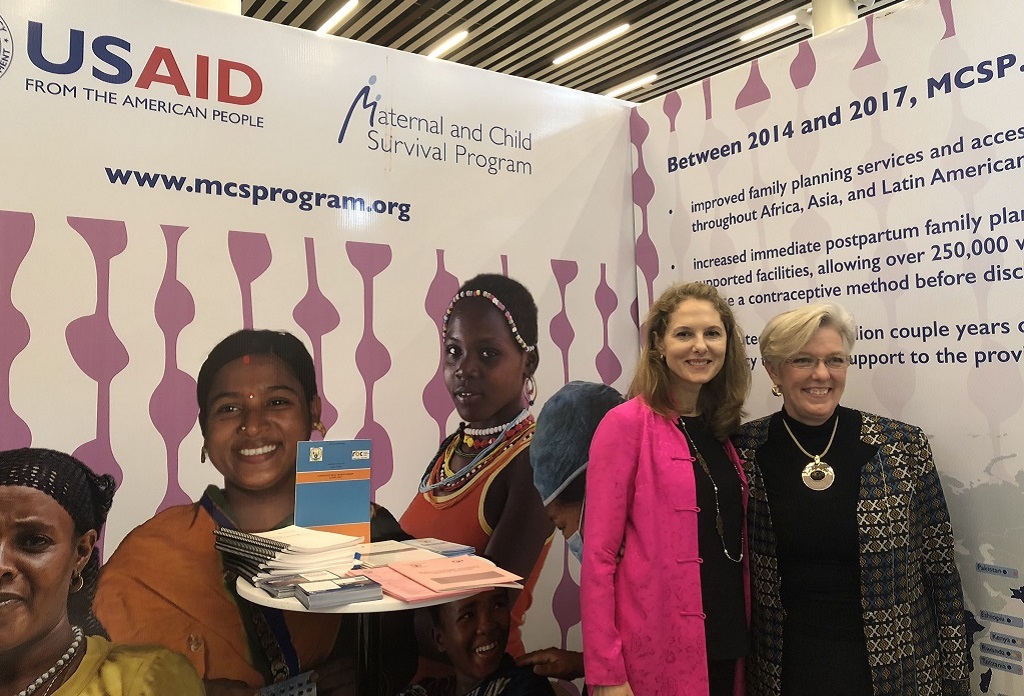This year’s International Conference on Family Planning was held in Kigali, Rwanda – a fitting setting given the country’s dramatic increase in modern contraception use and decrease in births in recent years. Co-hosted by the Bill & Melinda Gates Institute for Population and Reproductive Health and Rwanda’s Ministry of Health, the event brought together a range of participants – political leaders, scientists, researchers, policymakers, programs managers, and donors – with a common goal: increasing voluntary, high-quality contraception for all women.
Across 40 presentations, posters, and roundtable discussions, MCSP shared what we’ve learned works to close the contraceptive access gap for the millions of women in low-resource countries who wish to delay or prevent pregnancy. The majority of our work was presented by field staff – on addressing the unique needs of adolescents and the urban poor; reaching rural, underserved communities; expanding and strengthening the “contraceptive basket,” and more – all illuminating why family planning (FP) remains one of the best investments in public health and critical to our efforts to prevent needless maternal and child deaths.
A special treat was a booth visit from Her Royal Highness Sarah Zeid, Princess of Jordan, and USAID’s Dr. Alma Golden!
After the conference and with our FP2020 colleagues, we gathered with 100 attendees from 21 countries to witness and discuss Rwanda’s remarkable scale up of postpartum family planning (PPFP). To see how this strategy translates on the ground, we visited several MCSP-supported sites before strategizing on how to accelerate progress through advocacy, data use, and renewed action in our respective countries and programs.
We left having developed action plans to bring us closer to our collective 2020 goals, continuing the momentum from Chiang Mai to ICFP and beyond!
Presentations
- Tracking the Post-discontinuation Contraceptive Use Pathways in Rwanda: Second Analysis of 2014-15 Demographic and Health Survey
- Early Lessons from Implementing Clinical Safety Checklist for Voluntary Female Sterilization in India
- Increasing Use of Health Services among First-Time Young Parents through an Integrated Reproductive, Maternal & Newborn Health Approach: Lessons from a Proof-of-Concept in Madagascar
- Our First Baby: A Gender-Transformative Approach to Increase Use of Maternal, Reproductive Health, and FP among First-Time/Young Parents in Mozambique
- Improving Provider Skills and Increasing Voluntary FP Uptake through Clinical Mentorship: Experience from 10 Districts in Rwanda
- Community Health Mentorship as an Innovative Approach to Strengthen Knowledge, Skills, and Links Between Clinical and Community-based Provision of FP
- Results from Training Additional Community Health Workers in Community-based Provision of FP in Rwamagana and Kamonyi Districts in Rwanda
- Strengthening PPFP Counselling and Provision in the Immediate Postpartum Period Increases Uptake of PPFP in Rwanda
- Voluntary Tubal Ligation under Local Anesthesia by Mini-Laparotomy Provided in Outreach Increases Access and Service Provision of Permanent FP Methods in Rwanda
- From a Classic Training Approach to an On-site Training Approach Improves Provider Knowledge and Skills: Learnings from Rwanda
Posters
- Increasing Voluntary Uptake of FP at Kenani Refugee Camp in Nchelenge District of Luapula Province, Zambia
- Role of Rwanda’s Parliament in Promoting Voluntary FP: Achievements in Improving Legislation & Accountability
- Integration of PPFP Counselling in Community Health Workers’ Home Visits to Pregnant Mothers’ Families to Strengthen Voluntary PPFP Uptake
- Cost Analysis for Scaling Up an Immediate PPFP Intervention in Rwanda
- Advocacy for Inclusion of Indicators in the National Health Management Information System to Measure PPFP Uptake in Rwanda
- Contribution of Mass Campaign and Service Delivery through Outreach to Increase Family Planning Uptake, Rwanda
- The Role of Health Posts in Providing FP for Populations Living in Catchment Areas Served by Faith-Based Health Centers in Rwanda
- Scaling up Immediate PPFP in Rwanda
- Exploration of the Characteristics of Clients Seeking Voluntary Vasectomy in Rwanda
- Measuring Institutional Sustainability of FP Training Units: Evidence from Pakistan
- The Role of Male Partners in the Use of FP and Maternal Health Services by First-Time Adolescent Mothers in Nigeria
- Quality Improvement for PPFP: Selected Health Facilities in Ebonyi State, Nigeria
- Expanding Contraceptive Access for Postpartum Women through Competency Based Training: Learning from 2 States in Nigeria
- Improving Access to Services through FP and Immunization Service Integration in Malawi
- Améliorer le counseling en planification familiale dans les services intégrés en utilisant des cartes conseils adaptées à la stratégie de counseling équilibré Plus
- Introduction of the Levonorgestrel Intrauterine System in the Public Sector in Kenya Shows Early Positive Uptake
- Contraceptive Implant Failures among Women on Antiretroviral Therapy in Nine Facilities in Western Kenya: Implications for FP Counseling for Women Living with HIV
- Expanding and Strengthening the Public Sector Contraceptive Basket with Progestin-Only Pills in India
- Feasibility of Population-Level Tracking of PPFP Choices and Uptake among Women Giving Birth at the Kebele Level
- Améliorer l’accès aux services de PF pour les communautés rurales mal desservies en RDC
- The Effectiveness of Linking Facility-Based Youth Corners and Youth Clubs at the Community Level to Increase Voluntary Use of FP and Other Reproductive Health Care by Young People
- PPFP: Amenorrhea, Exclusive Breastfeeding, and the Timing of FP Uptake in Rwanda: Secondary Analysis of Demographic Health Survey 2014-15
- Tracking Post-Discontinuation Contraceptive Use Pathways in Rwanda: Second Analysis of 2014–15 Demographic and Health Survey
- What Gets Measured Matters: Review of FP Indicators in National Health Management Information Systems of 18 Countries
MCSP Satellite Event Presentations

